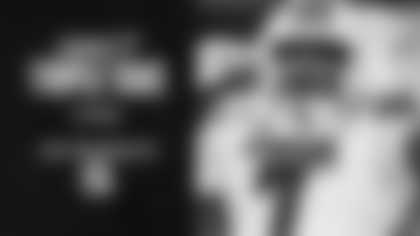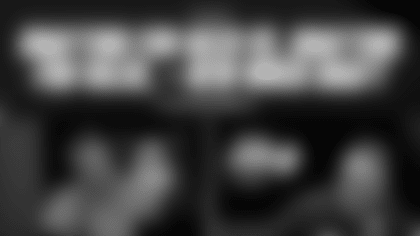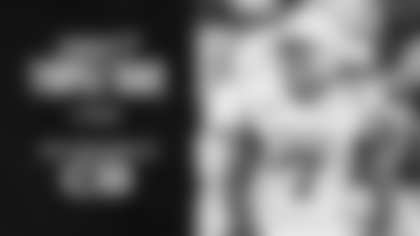By BOB KRAVITZ
Reprinted, Courtesy of PFRA
Originally published in 1985
HOUSTON -- The man in the cowboy hat was holding court. Boots shined clean and head held high, former Steelers wide receiver Buddy Dial had three businessmen in the palm of his hand. Their attentive gaze was unwavering, punctuated by bursts of laughter.
The man in the cowboy hat was happy and in control -- just good ol' crazy Buddy, the man with the magnetic personality.
If only every day could be so sweet ...
But they are not. Soon after lunch at a Houston hotel, Dial, 48, was examined by his urologist, who checked to see how thoroughly his failing kidneys still function. Later, he drove back to his mother's home in suburban Tomball, took a pain pill to ameliorate the chronic pain in his back, soaked in a tub of hot water and prayed that he would be able to face tomorrow.
Dial's story is one of pain, the sort of acute, excruciating, chronic pain that reduced a wealthy, happy, successful football player to a shattered, drug-ravaged man. A man who would take 50 Percodan at a time to ease that pain. But it also is a story of rebirth, of a measured and tortuous rise from damnation in a personal purgatory.
And it is a story that continues day to day -- even minute to minute -- for Dial's stranglehold on existence is tenuous at best.
"I don't have much left of my kidneys and I don't have much money," Dial said in his Texas drawl. "But I've got some hope now. Not so long ago, the doctors were giving me up for dead. And I'll tell you what ... I'm proud, real proud, that I've been able to survive."
But he suffers. Every minute of every day. He winces when his car crosses a speed bump. He groans as he leaves his chair for the buffet table, emerging to expose a painfully attenuated build. The lower back is wrenched forward, rigid as an ironing board; the walk is ginger.
Dial, who played for the Steelers (1959-63) and the Dallas Cowboys (1963-66), has had four back operations, all the result of football injuries. None reduced his torment.
It led him to pain-killing drugs -- specifically Darvon, Demerol and Percodan -- and a period of hopeless addiction and degradation.
That addiction ruined his kidneys. Dial has 10 percent kidney function -- "They're literally flaking off. I had nine stones last year " -- and some day will need dialysis or a transplant.
"A lot of people might have taken a gun and finished themselves off," said Mike Gaechter, a former Cowboys teammate and the man Dial credits with saving his life. "I mean, God is testing Buddy regular."
There was a time when Dial's life was a wondrous adventure.
A slick, All-American wide receiver at Rice, the country boy from Magnolia, Texas, became a star with the Steelers, when he teamed with another Texan, quarterback Bobby Layne. As of 1985, Dial held the team record for touchdown catches in a season (12) and was one of three Steelers to gain more than 1,000 receiving yards in a year.
"I remember the first game I started was in Yankee Stadium," Dial said, shaking his head with the memory. During warm-ups, Dial was daydreaming when Layne whizzed a football that hit Dial in the head.
"Dammit, Dial," Layne said in his gravel-cut, whiskey voice. "If you wanna sightsee, take the Grey Line tour tomorrow. We're here to play a football game."
When he played, he was a smart and swift receiver who loved to free-lance.
"Used to eat me up alive when (the Cowboys) played Pittsburgh," said Gaechter, a former defensive back. "He nearly got me cut."
Life got sweeter when Dial was traded to Dallas in 1963, where he got top billing on the "Dial and Meredith Show." He was the Cowboys player with the biggest, most opulent house and the only one with a $26,000 membership at the exclusive Preston Trails Country Club. He was the toast of the town and had a hand in numerous business interests.
But injuries limited his playing time in Dallas in 1964, 1965 and 1966, and a back operation in the summer of 1966 -- "sheer butchery," Dial calls it -- increased his pain and forced him to retire. Two more operations, the last in 1970, served only to make life unbearable.
Soon, he was abusing pain killers.
"Everybody comes equipped with different coping mechanisms," said Lee Roy Jordan, a former Cowboys linebacker also instrumental in helping Dial back on his feet. "Some people have a high enough pain threshold that they can psychologically and physically absorb the pain. Others can't."
Many performers never learn how to get off the stage. Dial was among them, and his crippling back pain only moved him farther from the limelight. Depressed and ailing, Dial began using Doriden tablets, but soon suffered epileptic seizures upon withdrawal.
Later, he began using Darvon, Demerol and Percodan. Slowly, his family life, his wealth and his self-respect disintegrated.
"Buddy got as low as a man can go without dying," Jordan said.
A teetotaler who never danced or saw a movie until he was well into his 20s, Dial had found physical and psychological refuge in pain-killing drugs.
"He felt he needed them to survive," Gaechter said.
But the doses became more and more massive as his tolerance built.
"I would come home from work on a Friday ... and I'd start taking pain pills so I could take the family out riding motorcycles and water-skiing," Dial said. "I didn't want them to see their daddy as a cripple, so I took pills all weekend. We were having the time of our life.
"But then come Monday, I'd be hurting so bad because of the big weekend, I'd take some more pills, and so on and so on ... I stayed on a constant high.
"... Of course, it was a very expensive physical situation."
It also cost him his wife, Janice, who left him in 1975 and divorced him in 1977, then remarried.
Dial continued to get drugs by going to different doctors -- one on Monday, another Tuesday and yet another Wednesday.
"Buddy's got the personality," Jordan said. "He can talk anybody into anything."
The drugs were in vast supply, but Dial's money wasn't. After a life of high rolling, he no longer could make a living and it was time to sell out.
He once had 11 cars; soon they were sold. He owned a dress company, a motorhome manufacturing company, a chain of fried chicken stores and more -- all of it had to go. During the divorce settlement, a time when Dial nearly died because of renal failure, he signed away his assets and kept all the liabilities.
"When he was in Dallas, the millionaires at the country club liked him and steered him toward a lot of good things," Gaechter said. "But Buddy is an absolutely terrible businessman. He's just a good ol' boy, who was really too good to a lot of his partners."
Dial agreed.
"I don't think it's a matter of being too nice a guy. It's a matter of being stupid. Period. I can start a deal -- I'm great at that -- but I can't manage a deal. That's my weakness."
Even when he had the opportunity to make money, Dial's fuzzy reality prevented him from pursuing his due.
"The man breaks his neck (in 1979) when a Coca-Cola truck rear ends him," Gaechter said. "So what do you figure you can make from that deal? From a big company like that? You can set yourself for life, right?
"Not Buddy. He never went to court, never got a lawyer and settled out of court for 20 grand. That's how afraid he was of being shown as a drug addict."
Dial's life lost all focus when he faded from view in 1979. He hid from the world for six months and became "a zombie" while on Demerol. Ashamed and withdrawn, his weight dropped approximately 40 pounds.
During that six-month period, he had five car wrecks, including three in one weekend.
"It was the lowest I've ever been."
Finally, Darren, his oldest son who was living with him, suggested that his dad enter a drug clinic.
"I can't describe the way he said it," Dial said. "I'd put this kid through hell and he wanted to help me ..."
Dial emerged more than a month later having controlled his dependence on massive amounts of medication. But the drugs had been eating way at his kidneys since 1976, and by 1979 he was a regular hospital visitor. Twice that year he was saved by kidney operations. He was further hospitalized for renal colic, severe back pain ... the list went on.
Clearly, Dial was not out of the woods yet.
As guardian angels go, Gaechter was a most unlikely candidate.
Gaechter, who had done well in outdoor advertising, was everything Dial was not -- a sophisticated, liberal Northerner and a Jew. Dial, conversely, "lived so far back in the woods, we had to drive toward town to go hunting." A Pentecostal Christian, Dial said he was judgmental toward free thinkers like Gaechter.
But the two had a link. "Mutual respect," Dial said.
Dial had moved back to his parents' home after having sold a $2,000 watch to finance the move.
"I tried to get in touch with him a number of times," Gaechter said. "But it was pretty obvious he didn't want to be found."
Finally, in 1981, Gaechter ran into Dial's old Rice teammate, Dickie Moegle, who told Gaechter that Dial had moved back with his folks in Tomball. Gaechter called. Dial agreed to meet him in Houston.
"The man saved my life," Dial said. "Any later, I'd have been dead."
Dial needed spiritual, financial and medical help, and Gaechter helped provide it. Dial's kidneys and psyche were in disrepair, so Gaechter led the crusade to raise money.
In December of 1981, Dial's urologist, Sam Axelrad, led the patient to his brother David, a Sacramento psychiatrist. Dial spent Christmas at the Pain Center in California.
There, hypnotherapy and other devices were used to teach Dial how to manage his pain with minimal medication. Further, and perhaps more importantly, the doctors were able to measure -- and thus confirm -- that Dial's pain was real.
"The best thing they could have done for me was to let me know that I wasn't crazy like my ex-wife thought I was -- that I wasn't just a drug freak, that I did have pain. And that was the beginning of old Buddy feeling like he could survive."
That is what Dial has done -- survive. Not prosper, just survive.
Dial hopes his story will lead others to seek help, and he continues working to raise funds for the newly established National Pain Foundation in Washington. Axelrad, the doctor who helped him in Sacramento, is the center's chairman.
But it is clear, Gaechter said, Dial "will never lead a really decent life." He still needs to take a mild pain reliever.
He also remains in a financial mess. To his surprise, the $4,000 he receives monthly from the National Football League pension fund is taxable income. So now he's playing catch-up with Uncle Sam, paying the bills at home while putting four children through school.
Dial is in and out of the hospital and needs to drink water almost constantly to keep his kidneys working. There will be a good day, then three bad ones, a good day, then more pain.
Two weeks ago, as he was driving to a banquet in Houston, part of his kidney flaked off and lodged on his right side. The pain made him pass out. "Thank God I was in the far right lane because I swerved off onto the shoulder." He gained consciousness later, turned around and drove home.
Three days later, he passed the stone.
He is tormented regularly but has learned to battle the loneliness and psychological fatigue. Though he has not dated a woman in more than four years, he does have his children. They did not abandon him.
"David (15) is just beautiful. He manages my life," Dial said. "He'll say, 'C'mon, Dad, let's go lay down, and he'd lay there, wide awake, but would stay there to make sure I got some rest."
Resting is the prime component of Dial's life. Every morning, he checks to see if he can sit up in bed, make it to the bathroom, make some coffee. More often than not, he fails. And then he is back in bed.
"It's funny, going back to these Cowboys alumni meetings. All the guys stand around talking about their business deals, then say, 'What's up with you, Dial?' 'Oh, I'm reading this good book and I'm really interested in this TV series.'" Clearly, it hurts.
As Dial was leaving the Houston hotel, he again was surrounded by business men who are helping him finance the Pain Foundation.
"Ah swear, Dial, you get more going in 10 minutes than any person I ever saw," one said.
Dial smiled, donned his hat and walked toward the car. Ol' Buddy was happy, alive and kicking. If only every day could be so sweet.





